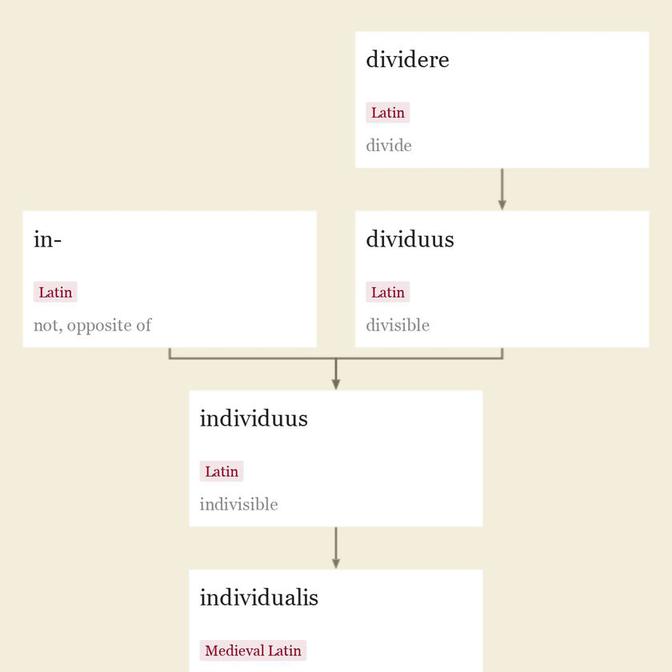individuality (n.)
1610年代,“个人特质的总和”,来自 individual + -ity,或来自中世纪拉丁语 individualitas。指“作为个体存在的状态”始于1650年代。
最早记录年份: 1610s
individuality 的相关词汇
individual (adj.)

15世纪初,“一体不可分割的”(指三位一体)来自中世纪拉丁语 individualis,来自拉丁语 individuus “不可分割的”,来自 in- “不,相反的”(参见 in-(1))+ dividuus “可分割的”,来自 dividere “分割”(参见 divide(v.))。原始意义现已过时; 这个词在1600年前并不常见,15世纪的例子可能是个例外。指“单一的,独立的,只有一个人或物”的意思来自17世纪; 指“为一个人而设计的”的意思来自1889年。
Individual views a person as standing alone, or persons as standing separately before the mind: as, the rights of the individual; the rights of individuals: it is incorrect to use individual for person unemphatically ; as, there were several individuals in the room. [Century Dictionary]
Individual 将一个人视为独立的,或将人们在思想中分开:例如, individual 的权利; individuals 的权利:使用 individual 来代替 person 是不正确的; 例如,房间里有几个 individuals。[世纪词典]
-ity
这个词缀用于从形容词中构成抽象名词,表示“成为______的状态或品质”,源自中古英语的 -ite,来自古法语的 -ete(现代法语为 -ité),直接源自拉丁语的 -itatem(主格为 -itas),表示状态或品质的后缀,由 -i-(来自词干或连接词)和常见的抽象后缀 -tas 组成(参见 -ty(2))。
Roughly, the word in -ity usually means the quality of being what the adjective describes, or concretely an instance of the quality, or collectively all the instances; & the word in -ism means the disposition, or collectively all those who feel it. [Fowler]
大致上,以 -ity 结尾的词通常表示形容词所描述的品质,或具体的品质实例,或所有实例的集合; 以 -ism 结尾的词表示倾向或所有感受到这种倾向的人的集合。[福勒]